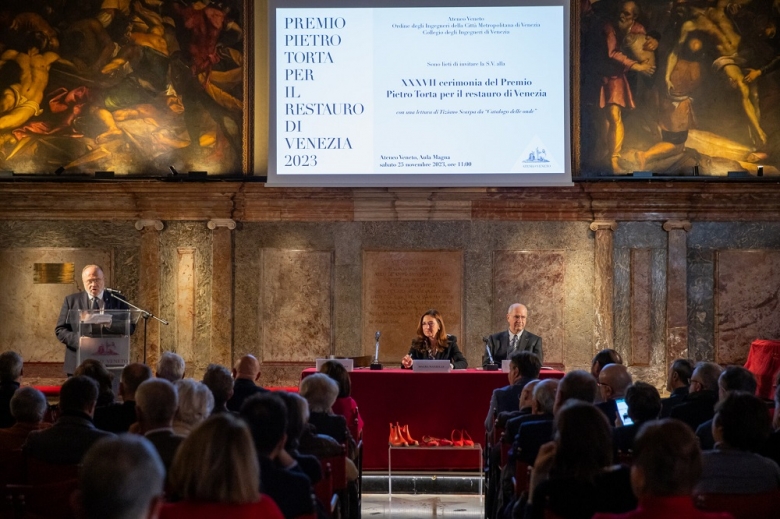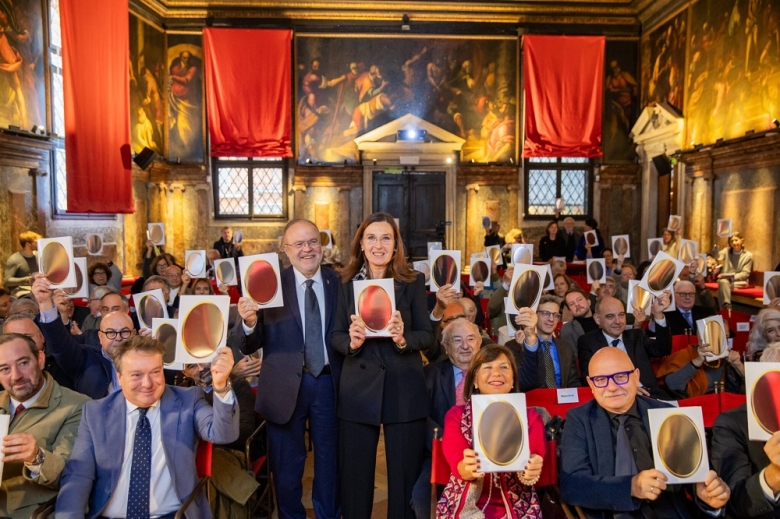Premio Torta, a Venetian testimony to the power of heritage
On 25 November, only a week after the NEB event, Europa Nostra attended the Premio Torta Ceremony, awarded by the Ateneo Veneto every other year to the best restoration in town. This year it was awarded to all the Venetian citizens for the great care and dedication they put into maintaining their city. Among the members of the Jury is Francesco Trovò, Professor at Università IUAV in Venice and a member of one of the Selection Committees of the European Heritage Awards / Europa Nostra Awards.

© Marta Buso/Ateneo Veneto
Carla Toffolo, Project Coordinator of the European Heritage Hub attended the ceremony on behalf of Europa Nostra. “There is no better ‘restorer’ of one’s own city, than those who take care of it on a daily basis, within the scope of their skills and possibilities and with great awareness. It is precisely the Venetian citizens who are working tirelessly to hand over the heritage they have inherited to the younger generations. An urban and social fabric that is undoubtedly fragile but which can become a laboratory for the future, for a shared and sustainable city project, emblematic of the dynamics underway in other national historic centres”, she noted after the event.
Maura Manzelle, the President of the Jury and Professor at Università IUAV di Venezia, stated in her lecture: “We must not ‘save’ the city from transformation, especially if we read this element inherent in its history as a condition inherent in its existence and its continued existence. […] Indeed, many reflections developed on Venice during the 20th century […] and have aimed to foster the vision of a city ‘alive’ just when people were beginning to think about how to preserve it, shifting attention from the restoration of individual monumental architectures to the consideration of the unity of the historic centre as a complex space and complex and unified social fact. Nor must we save the city from those who do not live there: a city of exchanges, of innovation, Venice has never founded its identity on exclusion […] and today, moreover, the society in which we live requires us to think in a more complex way of the concept of ‘citizen’, including different meanings: those who frequent the city permanently or for periods; who inhabit it for longer or shorter periods; […] and it would also be necessary to examine in detail the various possible declinations of tourism”.

© Marta Buso/Ateneo Veneto
Tiziano Scarpa, a renowned and multiple awards-winner local writer, read excerpts from his work “A Catalogue of Waves” published on ‘Wave 2023’, an annual monographic magazine of Iuav: “Relational waves are those that form in the widest channels, and in the lagoon, give rise to the relational waves, with which human beings driving their boats express hostility or kindness”.
Venice cannot live without the waves of its lagoon and its broader ecosystem, but even more it needs its social relations with the world and within the city. This is why the lagoon and Venice, including its treasured cultural heritage, can be part of the foundation of our much needed triple transformation, the guiding pillars of the European Heritage Hub project’s activities.
From 27 to 30 September, Europa Nostra brought together over 700 heritage practitioners and enthusiasts to the World Heritage City of Venice to participate in the European Cultural Heritage Summit 2023. It was a particularly special occasion, coinciding with Europa Nostra’s 60th anniversary. The choice of Venice was deeply symbolic. The European history and significance of this city, coupled with its breathtaking yet fragile beauty, has always been at the very heart of the mission of Europa Nostra – from 1963 to date.






